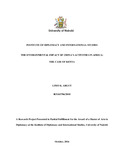| dc.description.abstract | This central research sought to address the impact of China‟s development and industrialization activities and its trade with Kenya on the environment from the period between 2001 and 2011. This study found out that first, China-Africa relations are a rather more complex phenomenon; they are rooted in a long history comprising of economic, socio-political, strategic and cultural dimensions. This relationship is in three phases: the formative phase, the restructuring phase and the consolidation phase. Secondly, literature review shows that China‟s relations with Kenya have evolved significantly. They have been driven by development ventures related to China‟s need for natural resources such as crude oil to power its modern, growing economy and also support its expanding industrial base. As well as catering for the rapid growth of its manufacturing sector. Countries like Zambia and Gabon continue to bear the brunt of environmental degradation that is resultant from its relations with China. Therefore, there is need for Kenya to strengthen its policies and regulations in the conduct of its relations with China. Thirdly, it is evident from the research that China‟s development strategy prioritizes resource extraction for the global market; this has had negative ramifications on the environment. Just like any other development partner, China is interested in natural resources just like other donors and has transferred some industries in Kenya. Most of the industries that have been transferred from China usually have a large carbon Impact. Therefore, there is need to strengthen existing policies and regulations so to guard against dirty industries. Five key concerns and debates are the outcome out from this study. They include the question of equality and mutual benefit, the role of China in environmental diplomacy, transfer of dirty industries and waste trade and Economic Development vs. environmental protection. Therefore there is need for Kenya to look into these debates and address these key issues. This study recommends that first, for Kenya to benefit equally from its trade relations with China, there is need for it to invest more in the products in which it has comparative advantage. Secondly, there is need for Kenya to strengthen existing environmental laws and policies so that all the investments that China and other countries make in Kenya have minimal impacts on the environment. It should also heavily tax and introduce cumbersome procedures for transfer of industries that impact negatively on the environment. Lastly, Kenya should entrench low carbon development policies in its negotiations with potential investor countries. | en_US |



